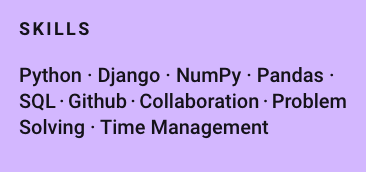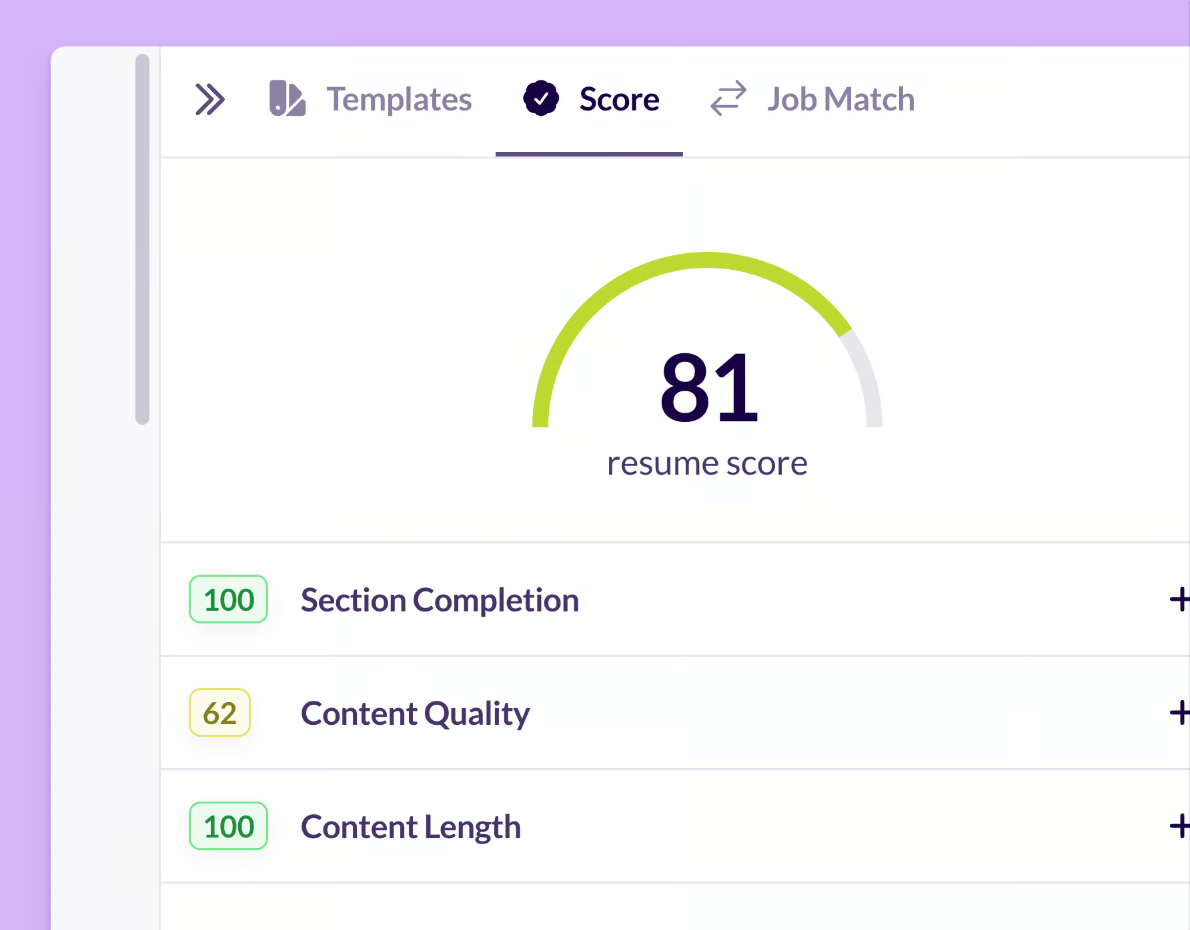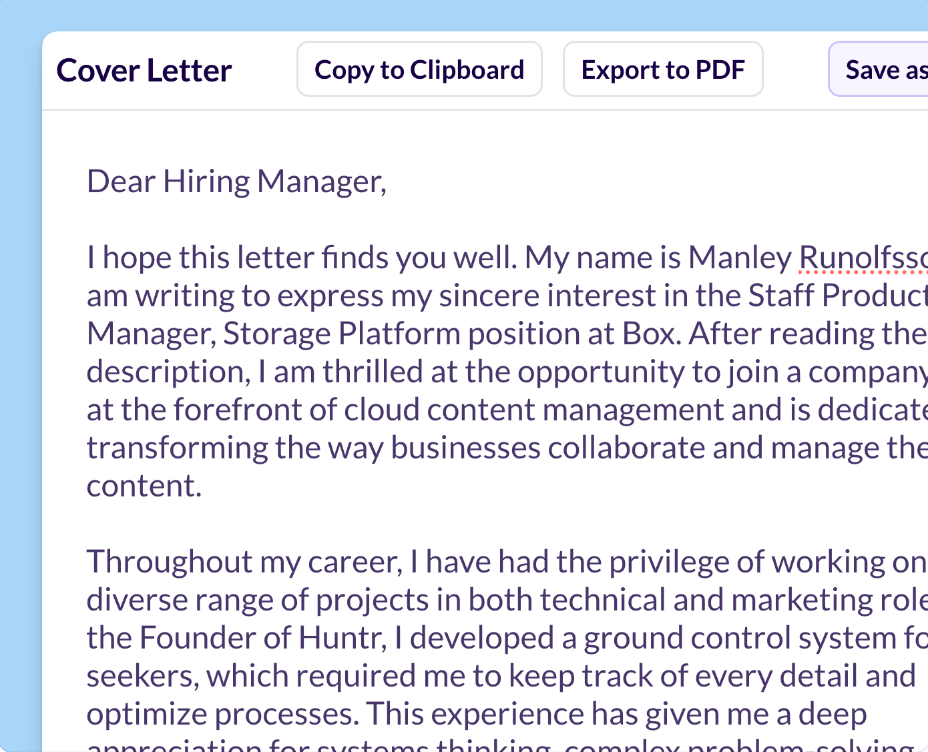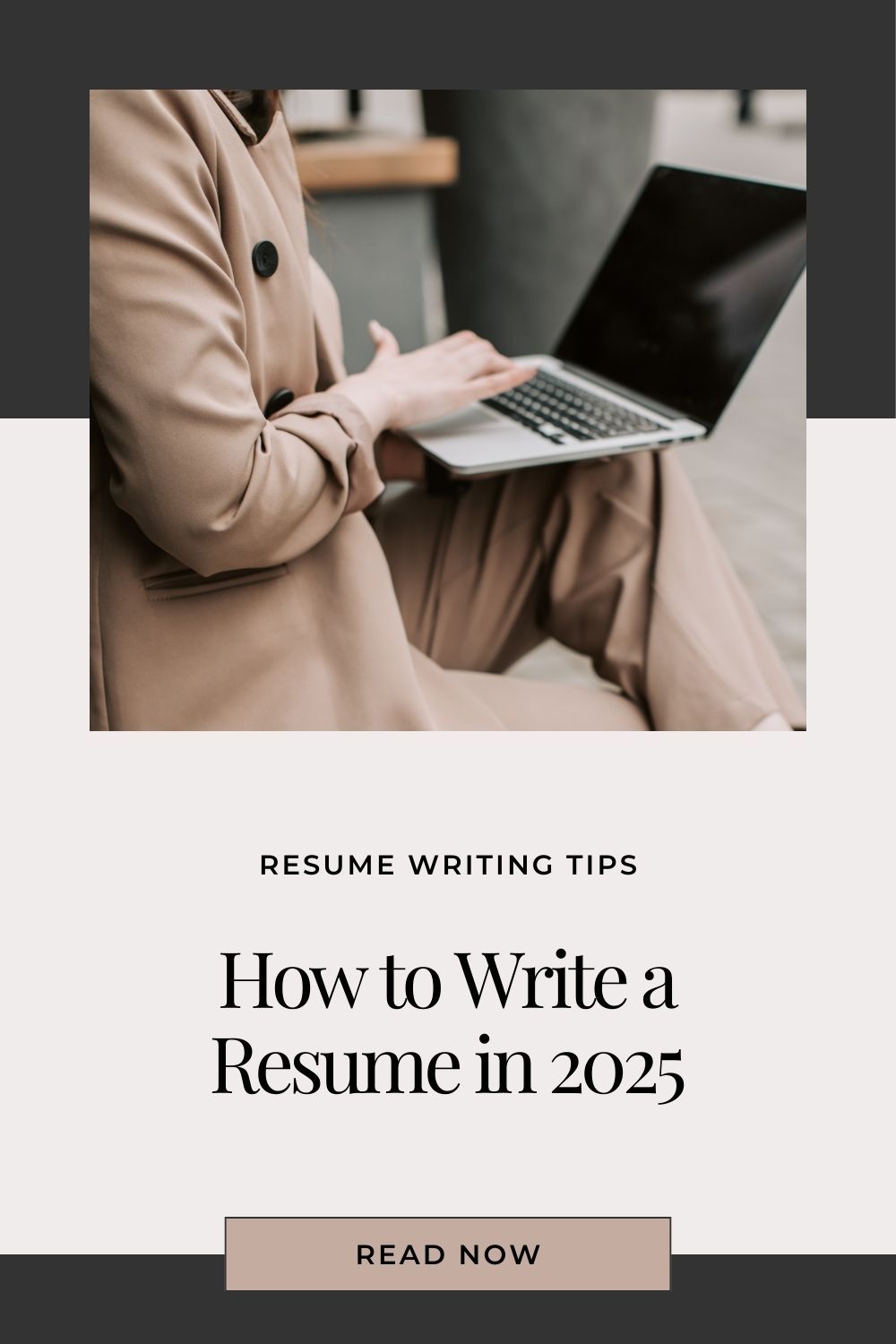Huntr Blog
How to Write a Resume That Lands You Interviews in 2025
November 21, 2024
Writing a resume is one of the most important things you need to do when you embark on your job search. But not everyone can write. And some people struggle to really sell themselves. You don’t need to be a professional resume writer to be able to produce a great resume that helps you land a great job (or better yet a dream job). In this article, we’re going to break down how to write a resume that lands you interviews in 2025 while sharing valuable insights that’ll help you throughout the process.
Want to write an amazing resume?
Sign up for Huntr to use AI to help you write your resume. Easy to edit to make it your own.
How to Write a Resume in 2025: A Beginner’s Guide
1. Select a resume builder or template
So, back in the day, most people would use one of those Microsoft Word templates that come with your Office products to whip up a resume. Those resume templates were pretty handy at the time. But these days, technology in the career space has advanced enough that you can create a better and even more tailored resume to help you improve your chances of getting a job. For example, if you use an AI resume builder, you’ll have access to AI features that help you better craft your whole work experience. Now, we’re not saying you should just spend 5 minutes getting AI to write your whole resume for you because that’ll probably get you rejected. But if you use a tool like Huntr as a resume builder, you can add your job title or desired job title into your resume as a keyword and all AI suggestions will be tailored to those specific types of roles. So, if you use a specific software or tool for work and want to include a resume bullet point about it, you can actually generate a related experience of how people in that job would use that exact same tool for their job. A resume builder with AI functionality helps you forge new connections and ideas on how you can share your work experience. A basic Word or Google Docs resume template doesn’t have that kind of lift.

2. Compile all your biggest accomplishments
The next step you want to take when writing a resume is compiling a list of all your biggest accomplishments from your previous jobs. This is the hardest part of writing a resume, but there are ways you can make it easier. For example, if you have updated your LinkedIn before, you can use Huntr’s LinkedIn importer to automatically add your work experience from LinkedIn to your new resume to use as a starting point. You’ll be able to remove or add content to your resume as needed.
The second alternative for writing a resume when it comes to your accomplishments is to use AI to help jog your memory for all the great work you’ve done. For every role and job title, you’ll be able to generate AI suggestions that you can use to frame your thinking about what you did in your last role. Huntr’s AI will give you suggestions you can use or edit to help improve your overall resume. You can use them as a starting point to help you write your resume on your own, instead of hiring a resume writer.
3. Add your contact details
Next, you’ll want to add your contact details to your resume. Include your phone number, email address, location, and name. You don’t need to add your full mailing address to your resume, as that’s an outdated practice. Just keep the city and state/province. Alternatively, if you’re looking for a remote position, you might include the word remote in your resume, such as “Remote, United States.” If you’re looking for a job at a specific location to work on site, you’ll list your city and state/province to show that you live nearby.
Keep your email address professional. Stick with an email that includes your name and possibly a number at the end if you have a common name. Don’t use any fancy or strange nicknames for your email addresses.
Also, triple check that your contact information doesn’t have any mistakes or typos. If it does, you’ll likely hear crickets and it’ll take a while before you realize the mistake. So, check your phone number and email address to ensure you’ve listed the correct contact information.

4. Write a resume summary that clearly defines your value
When you write a resume, the goal is to help people understand why they should want to hire you. Your resume summary is a great way to showcase your main value proposition to a recruiter. You can use AI to help generate a resume summary that explains your value or what you offer. If you choose to write your own resume summary, think about what’s truly unique about your work experience.
In addition to including a key achievement or milestone, also think about what type of niche you have. For example, I’ve worked at multiple startups as a marketer. So, when I write a resume summary, I use my experience in startup culture to help position myself for those kinds of roles. The niche, in this case, revolves around the business stage of where my skill set shines in marketing. So my resume summary reads, “Results-driven marketer with over 10 years of experience helping startups transform into household names. Proven track record of generating millions of blog views, securing media coverage, and generating sales using content marketing, SEO, growth marketing, public relations, and sales strategies.” It highlights my biggest accomplishments, has a defined niche, highlights my experience, while also sharing some of my skills.

5. Fill in your work experience
When it comes to writing your biggest accomplishments on your resume, focus on writing them in the STAR format. STAR stands for Situation, Task, Action, and Results. You want to write a bullet point that captures what the context of the situation was, issues or things you had to work through to be able to accomplish your own, the action you took to achieve the goal, and what your end result was. For example, “Generated over 30 million pageviews in a calendar year through content distribution methods and SEO.”
The ideal resume is about one page long. That works out to be about three jobs with three bullet points per job. You could add between 3-5 bullet points per role depending on your role at that company. But three jobs and three bullet points per job is a good, easy to read length. The goal isn’t to have your entire work history listed there. After all, that’s what LinkedIn is for. Keep it simple when writing your resume. Get to the point and only share your biggest wins.

6. Add relevant educational experience
When writing your resume, you’ll also want to include relevant educational experience. The educational experience that’ll help you land your next role should be included as your educational experience. If you have a degree in nursing but are applying for a marketing job, then it’s best to leave the role off your resume (unless you’re applying for a healthcare marketing role). Stick to the educational experiences that make you qualified for the role. A carpentry certificate doesn’t help you for a vet tech role. The reason why people put educational experience isn’t just to show that you’ve learned something, it’s to show that you’ve learned the right skills to do this specific job.

7. Add in hard and soft skills
Due to ATS, your resume needs to include relevant keywords to pass through resume filtering systems. Companies often use technology to scan resumes to know who’s worth interviewing and who isn’t. Having the right keywords in your resume will help ensure that you’re able to get your resume read by the right people. Most resume builders include a skills section, where you can include relevant hard and soft skills.
You can use Huntr’s resume tailor to add specific keywords that are included on the job listing you’re applying to. Huntr’s AI will highlight the keywords on the job listing and allow you to add them to your resume in just a couple of clicks. So, whether they’re educational skills, soft skills, or more technical in nature, you’ll be able to add a variety of relevant keywords to your resume with ease in a skills section to better tailor your resume to pass filters.

8. Include relevant projects
In cases where you don’t have a ton of professional experience in an industry, projects could be a great way to highlight your skills. If you’re doing a big career change, you might list projects you’ve done to help pad out your relevant work experience. For example, if you’ve spent your career working in fast food, but want to become a developer, you might include projects of things you built using your own code. You could include a list of things you’ve built from scratch or freelance client work you’ve done. These projects showcase your experience in the industry.
Alternatively, this could also be a helpful section for new grads. Are there projects you’ve completed in school? For instance, a robotics student might have to create a robot as part of a class project. Whatever it is you learned in school or did a big project on, you should consider adding to your projects section to help a hiring manager see why you’re a good fit for a role.
9. Include relevant links
You can include social media on your resume. For instance, if you’ve built a personal brand around yourself in a specific industry, you might share a link to your social media account where you produce content around that niche. It’ll help give you clout to showcase your credibility in the space.
Portfolio links could also be added to your resume to showcase your experience. For example, a professional writer might share links to articles they’ve written. They’ll compile all their published articles into a list while linking out to it on their personal website. Keeping all your portfolio links in one central place makes it easier for recruiters to go through your entire portfolio with ease without overcrowding your resume. When writing a resume, having links to additional content can be a great asset for recruiters who are seriously considering you as a candidate.
10. Review and edit your resume as needed
After writing your resume, it’s important to review your resume for any resume mistakes. Editing and modifying your resume as needed can ensure you catch all those typos or grammatical errors. If you have a friend or family member who can take a second look at your resume, you can ask them for feedback to ensure you’re selling yourself well.
But we get it, not everyone has access to someone who can look over their resume quickly. That’s why Huntr has a resume checker feature that gives you a resume grade based on the contents of your resume. It’ll tell you if you use too many buzzwords, repeat too many of the same words, if your resume is a good length, if you completed all the necessary sections of your resume, and more.

11. Work on a cover letter
Now that you’re done writing your resume, you’re almost ready to apply for your first job. But first, you should write a cover letter to complement your resume. Your cover letter can give a bit more context and insight into why you’re applying for this position. It’ll help better sell you to a hiring manager by explaining what interested you in the role, why you’re a great fit, and showcases a bit of personality to help entice them into interviewing you for the position.
You can use Huntr’s AI cover letter generator as is or use it as a starting point for your cover letter. The tool generates a cover letter for you based on the job description and your resume content in seconds to help you create a fast cover letter for your next application.

Conclusion
Now that you know how to write a resume, you can whip one up in less than an hour. While it can seem daunting at first, today’s technology allows you to create a resume fast and with AI assistance to ensure you don’t miss any important details or accomplishments. If you’re looking for a resume builder with beautiful templates and AI functionality that’s easy to use, you can sign up for Huntr today.

Get More Interviews, Faster
Huntr streamlines your job search. Instantly craft tailored resumes and cover letters, fill out application forms with a single click, effortlessly keep your job hunt organized, and much more...
AI Resume Builder
Beautiful, perfectly job-tailored resumes designed to make you stand out, built 10x faster with the power of AI.
Next-Generation Job Tailored Resumes
Huntr provides the most advanced job <> resume matching system in the world. Helping you match not only keywords, but responsibilities and qualifications from a job, into your resume.
Job Keyword Extractor + Resume AI Integration
Huntr extracts keywords from job descriptions and helps you integrate them into your resume using the power of AI.
Application Autofill
Save hours of mindless form filling. Use our chrome extension to fill application forms with a single click.
Job Tracker
Move beyond basic, bare-bones job trackers. Elevate your search with Huntr's all-in-one, feature-rich management platform.
AI Cover Letters
Perfectly tailored cover letters, in seconds! Our cover letter generator blends your unique background with the job's specific requirements, resulting in unique, standout cover letters.
Resume Checker
Huntr checks your resume for spelling, length, impactful use of metrics, repetition and more, ensuring your resume gets noticed by employers.
Gorgeous Resume Templates
Stand out with one of 7 designer-grade templates. Whether you're a creative spirit or a corporate professional, our range of templates caters to every career aspiration.
Personal Job Search CRM
The ultimate companion for managing your professional job-search contacts and organizing your job search outreach.

